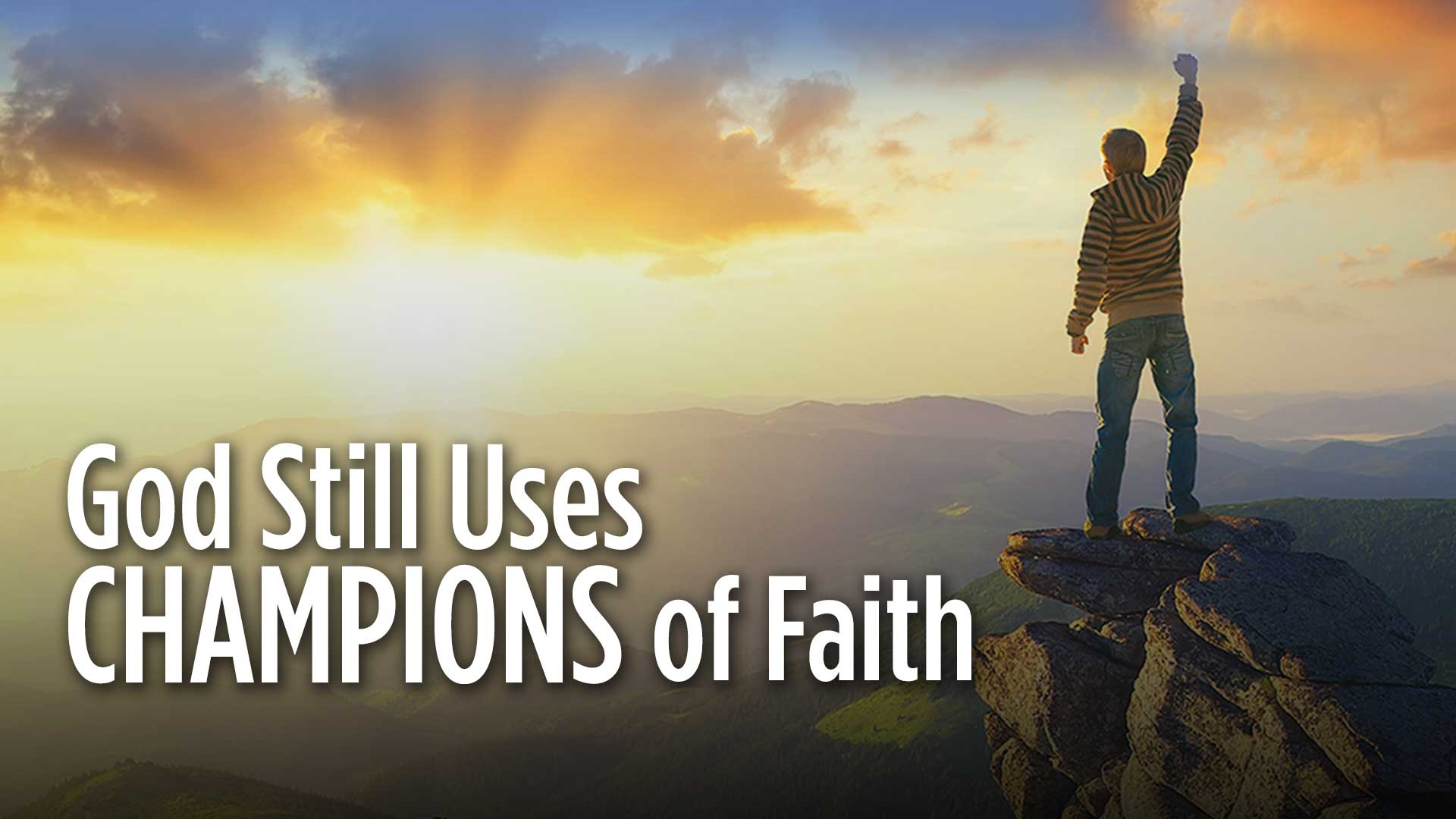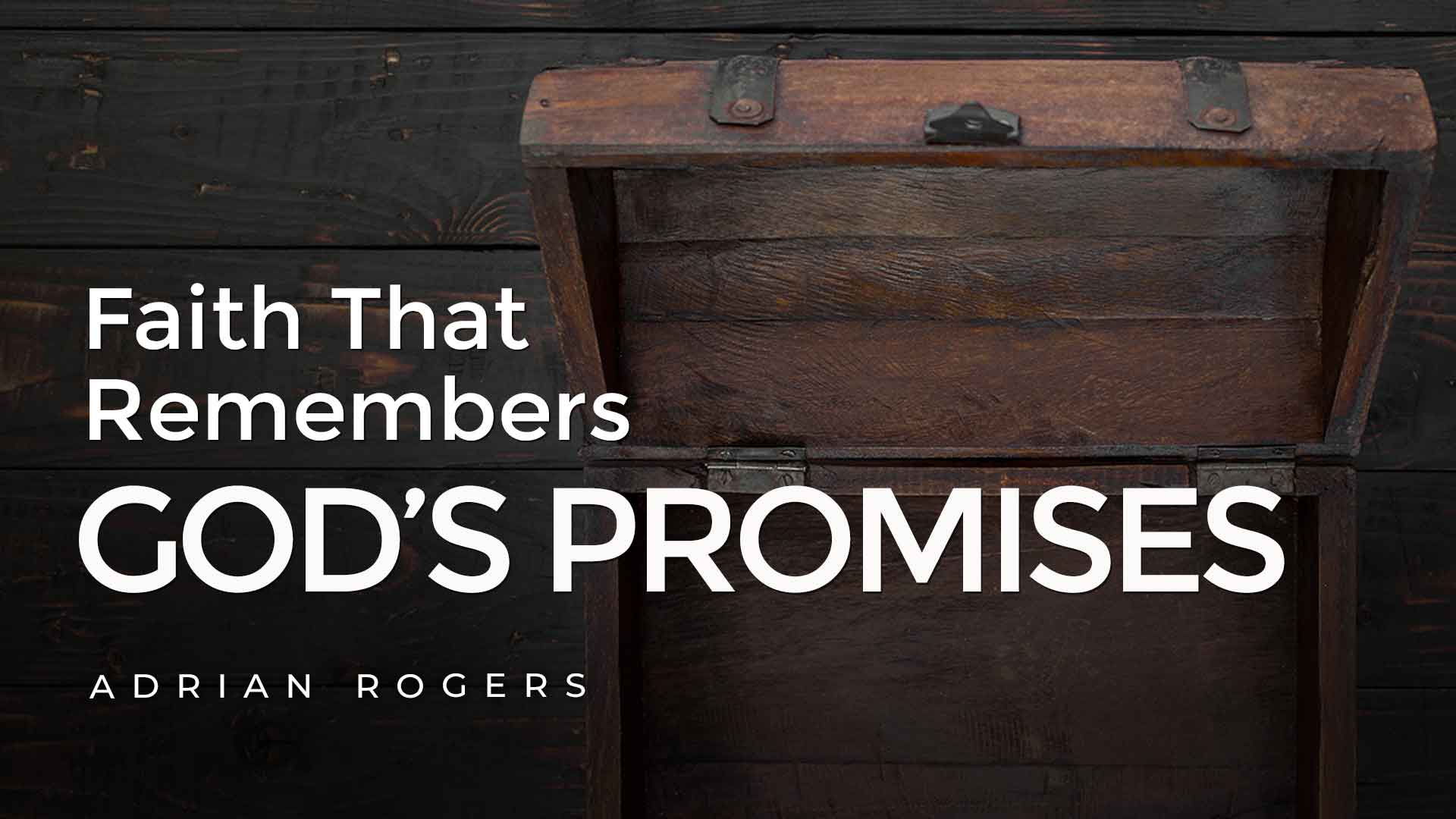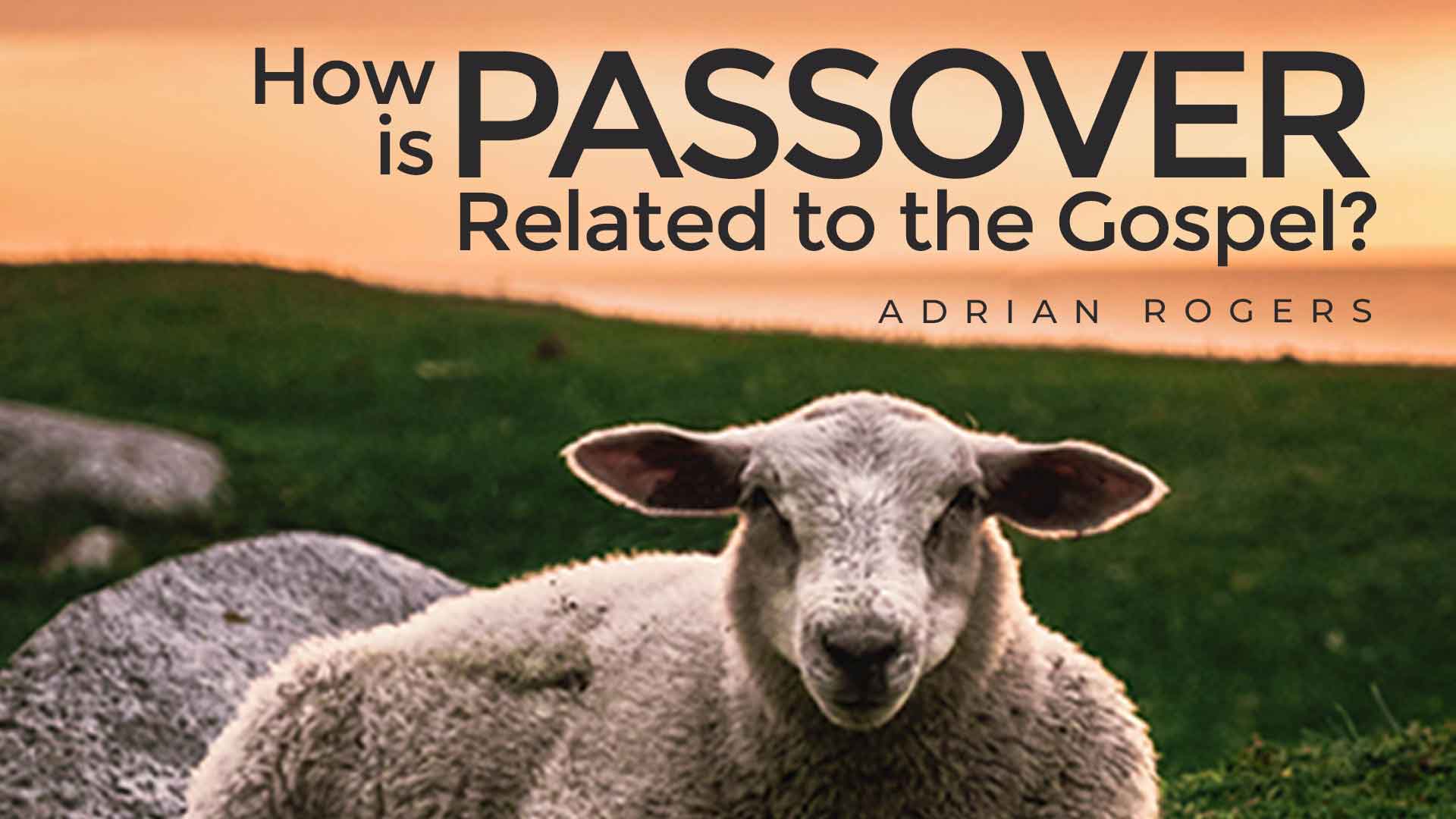

“Therefore we also, since we are surrounded by so great a cloud of witnesses, let us lay aside every weight, and the sin which so easily ensnares us, and let us run with endurance the race that is set before us” (Hebrews 12:1).
People often refer to the “cloud of witnesses” described in the previous chapter of Hebrews, Chapter 11, as “champions (or heroes) of faith.” Some consider their stories mere history lessons and look at Hebrews 11 as only a recitation of biblical characters who fought and won.
We forget that God still uses champions of faith. The heroes of Hebrews have much to teach us—some lessons from what they did right and some from the wrongs God redeemed. From these champions, we learn not only that faith is fruitful but also that weaklings can become warriors and failure isn’t final.
From Hebrews 12:1, we learn that the baton is now ours. “Let me tell you, folks,” Pastor Adrian Rogers said. “You’re the one now on the field. The Bible tells us that the heroes of the past are in the stadium. They’re watching us. There they are, from the heavens, peering down.”
What will they see: faith and victory or fear and apathy? Pastor Rogers asked: “Do you want God to use you or are you quite content just to go through life and make absolutely no impact on this world?”
Let’s examine four men—Isaac, Joseph, Moses, and Gideon—and the faith lessons we can learn from their lives. Then, we’ll turn our attention to what it feels like when our faith seems to fail us—when we just can’t catch our spiritual breath—and talk about how to get back in the race and “press toward the mark for the prize of the high calling of God in Christ Jesus” (Philippians 3:14).
Most people know the story of Isaac, the long-awaited son of Abraham and Sarah, the young man who willingly allowed his hands and feet to be bound and laid on the altar of sacrifice in obedience to Abraham, and whose life was spared by a lamb caught in the thicket—a lamb slain in his stead.
Isaac’s young life typified and prophesied the coming of the Messiah. Isaac loved the Lord. But as an older man, he failed his family by playing favorites and placing his culinary appetite ahead of his faith.
Pastor Adrian Rogers said, “The family is meant to be the seminary of Heaven, but I’m afraid for many it is an incubator of Hell.”
Secular culture teaches that families are the result of sociological influences and that as societies change the structure of families and the function and role that families play in society must change. This is anti-biblical.
In the Bible, “the first institution that God ever created was the family and He did that in the Garden of Eden to meet the deepest spiritual, psychological, emotional, and physical needs of mankind.”
The family was instituted first: before government, before education, even before the Church was instituted. The family is the basic unit of society.
Twice in history, the idea of the family totally disintegrated: Greek civilization in 300 B.C. and Roman civilization in 33 A.D. In both cases, the culture disintegrated because the family disintegrated.
God will take a family that is surrendered to God and do amazing things from generation to generation. But we’re also going to see that, even when a family falters, when it is dysfunctional, God can teach us great things.
Such was the family of Isaac. At the point that Isaac and Rebekah had twins Jacob and Esau, Isaac was a failure of a father who was leading a dysfunctional family.
He made many blunders and allowed himself to be led by his senses rather than by His reliance on God. He tried to give to Esau a blessing that God had told him belonged to Jacob, in part because he preferred Esau’s cooking, of all things!

God eventually got Isaac’s attention and Isaac became a hero for the family. Toward the end of his life, He was transformed into a faithful and disciplined father. The Bible says: “By faith Isaac blessed Jacob and Esau concerning things to come,” (Hebrews 11:20).
For the rest of the story about Isaac and his family, read the article, "A Dysfunctional Family Redeemed."
“By faith Joseph, when he died, made mention of the departing of the children of Israel....” (Hebrews 11:22).
Like his grandfather Isaac, Joseph was a godly young man. Most people know the story of Joseph being sold into slavery by his jealous brothers, his rise to power as a slave in the House of Potiphar, his wrongful imprisonment after he refused Potiphar’s wife’s sexual advances, his faithfulness while in prison, and his service and leadership to the entire nation of Egypt as prime minister at the right hand of Pharaoh.
Joseph was ultimately reunited with his family when he rescued them from famine and settled them in Egypt. Joseph remained faithful to God all his life. In fact, his parting words to his descendants may have been the greatest mark of all for this champion of faith.
You’re going to be leaving Egypt, Joseph said in effect. You’re going to the Promised Land. I’ll be dead. My body will turn to dust. My bones will remain. And when you go, take my bones with you.
“Joseph knew he was going to die,” Pastor Rogers said. “It didn’t bother him one scintilla of an iota. The Bible tells us in the Book of Hebrews that one of Satan’s ways to keep people in bondage is through the fear of death. Man is the only creature that knows he’s going to die and he’s trying desperately to forget it. I’m not afraid to die. I may be afraid of the act of dying, but I’m not afraid of the consequences of death. Neither was Joseph.”
Joseph was looking forward to the Promised Land. He was looking forward to the Messiah. Today we look back at the first coming of the Messiah, Jesus Christ, and toward His Second Coming. We look forward to the Promised Land of Heaven.
“If you know the Lord, death is not an enemy,” Pastor Rogers said, “but a friend that will usher you into the presence of Jesus.”
Joseph’s request regarding his bones teaches us three things about being a champion of faith:
About 300 years before Joseph’s death at age 110, God had made a promise to Abraham that his seed (Joseph’s generation) would be “a stranger in a land that is not theirs (Egypt)” (see Genesis 15:13-14). God had told Abraham, who told Isaac, who told Jacob, that the slavery in Egypt would last 400 years. The promise was that God’s people would come out of Egypt with great substance and would eventually settle in the Promised Land of Israel. Joseph believed God’s promise.
In Genesis 50:24, Joseph tells his family,” God will surely visit you and bring you out of this land.” Jacob believed the deliverance would be by the power of God’s hand.
Pastor Rogers said, “Delay did not shake Joseph’s faith. Now it had been 300 years since the promise was made—three centuries. And there was to be another one. Joseph is not speaking of his body; he’s speaking of his bones. He knew it was a long time coming.”
Joseph is not panicked. Scripture talks of him on his deathbed holding his grandchildren on his knees. He speaks with a ring of certainty and victory in his heart.

Rather than building a great pyramid for his bones in Egypt, he directs his people to bury him with his people in Israel. Rather than building an earthly monument to himself, he builds a monument of faith by believing in God.
For more about Joseph’s triumphant faith, including his family’s faithfulness to carry his remains to the Promised Land, read the article, "Faith That Remembers God's Promises."
Moses led God’s people out of Egypt 1,300 years before Jesus was born. His actions help us understand something of the power of faith in the shed blood of Jesus Christ.
Hebrews 11:28 says of Moses, “By faith he kept the Passover and the sprinkling of blood, lest he who destroyed the firstborn should touch them.”
Because of Moses’ faith, Hebrews enslaved in Egypt marked their doors with the blood of spotless lambs so that death would pass over them. This led them to freedom from bondage and a journey to the Promised Land. Every year Jews mark this transformation with the celebration of the Passover.
Because of our faith, Christians are washed clean with the blood of the spotless lamb, Jesus Christ. We are freed from sin and have new life in relationship with our Lord, something we celebrate with communion. At the end of our earthly journeys, we will live bodily in the Promised Land of Heaven.
In Passover, we see Calvary’s sacrifice in anticipation. At Calvary, we see the sacrifice in consummation. During the Lord’s Supper, we see the sacrifice in celebration.
“Do you see how it ties together?” asked Pastor Adrian Rogers. “God said to Moses, ‘Moses, take a lamb.’ That’s Moses’ lamb. Jesus is Mary’s lamb… a lamb without spot and without blemish.”
At Passover, Moses, by faith, directed God’s people to share the lamb. “A group of slaves are becoming a nation,” Pastor Rogers said. And a group of people are having fellowship around a land.” The Israelites ate the Passover lamb while dressed for travel, anticipating their exodus from Egypt.
Believers are a group of slaves to sin who have fellowship because of the spotless lamb, Jesus Christ. The moment we become Christians, we are to be dressed. We are to turn from the land of sin and journey out to share the Gospel and make disciples.

Through the entire story of the Passover and the Exodus, we see pictures of the Gospel. “You know, Moses knew,” Pastor Rogers said. “He understood that all of this was prophecy.”
For more about the Passover events and how they relate to the Gospel, read the article, "How is the Passover Related to the Gospel?."
Gideon was not the most faithful man when his biblical story began in the Book of Judges. His nation was in trouble because of its own sin, and his focus was distorted. He was looking back at God’s previous miracles, and instead of saying in faith, “I’m patiently waiting on You God,” he was saying in exasperation, “Why haven’t You shown up God”?
“Now the Angel of the Lord came and sat under the terebinth tree which was in Ophrah, which belonged to Joash the Abiezrite, while his son Gideon threshed wheat in the winepress, in order to hide it from the Midianites. And the Angel of the Lord appeared to him (Gideon), and said to him, ‘The Lord is with you, you mighty man of valor!’” (Judges 6:11-12).
Gideon made excuses. “My family’s poor and unimportant. Not only that, I’m the least important person in my family!” Gideon believed he was unusable, but God knew otherwise and told Gideon, “Surely I will be with you, and you shall defeat the Midianites as one man” (Judges 6:15).
Gideon listened and believed. He made an end to excuses and a beginning to a life of real faith.
Through the weak and insecure Gideon, the sovereign all-powerful God destroyed the altar of the false god Baal and defeated the Midianites. Gideon became the “mighty man of valor” God knew him to be.

Are you weak, lacking confidence, or the least in your family, your workplace, and your community? Have you ever considered that God may see you differently than you see yourself? Maybe you are not the unimportant person you think you are. Maybe as you exercise your faith muscles you will become the mighty man or woman of valor God already knows you to be.
For more about Gideon and his transformation, read the article, "Can God Use You?."
The heroes we’ve looked at in this article were all rewarded for their faith. God redeemed even their failures. But what about you? What about those times you ARE faithful and the results are unexpected; you haven’t failed God but your prayers are unanswered? The spouse you prayed for marries your best friend instead? The child you asked for isn’t given? Or the sick loved one you requested healing for does not recover?
Paul addresses those who are discouraged—those for whom faith seems to fail.
“Others were tortured, not accepting deliverance, that they might obtain a better resurrection. Still, others had trial of mockings and scourgings, yes, and of chains and imprisonment. They were stoned, they were sawn in two, were tempted, were slain with the sword. They wandered about in sheepskins and goatskins, being destitute, afflicted, tormented—of whom the world was not worthy. They wandered in deserts and mountains, in dens and caves of the earth” (Hebrews 11:35b-38).
Adrian Rogers said those who do not receive what they prayed for but remain faithful receive something better, a mature faith. If you are in that position now—your child or your spouse did not get well, or you are still waiting for some good and right thing you expected God to give you—“Don’t throw in the towel,” Pastor Rogers urged. You can have something better, a mature faith that:

Don’t give up! For more about how to grow into a mature faith even during your most difficult trials (or maybe, especially because of those trials) read the article, "When Faith Seems to Fail You."
Have you made a false start—your fledgling faith just never seemed to get going? Or maybe you were running strong and you’ve fallen and you’re sitting discouraged on the side of the track. It’s never too late, you’re never too injured, and you’re never disqualified, from the race of faith. No matter who you are, how many mistakes you’ve made, how old you are, or how discouraged you feel, you can still become a champion of faith.
In fact, if you consider yourself a believer—a follower of Jesus Christ—this race is not optional for you, Pastor Rogers said. You have a purpose to pursue: “You’re not just here to draw your breath, draw your salary, and just endure. You are to be a spiritual athlete.” You never get out of the race, Pastor Rogers said, “…until you draw your last breath.”
Your purpose in the race is NOT running to make it to Heaven; Jesus already took care of that on the cross. And it’s not to compete with other believers; they are running the race God gave them to run.

No, your race is against Satan himself, who desires to trip you, cause you to fall, discourage you from running, and undo all of the good work God has planned for you. It’s a race to be everything God called you to be for your good and for His glory.
For more about how you can prepare yourself for the race of faith, what the race will cost you, and how you can run with confidence and perseverance, read the article, "Do You Need to Get Back in the Race?."
Only those who know Jesus Christ personally are qualified to enter the race of faith. If you aren’t sure yet, you can find answers to your questions about Jesus Christ HERE.
If you are a brand new Christian, Love Worth Finding has some specific resources that will help you warm-up for the race so you can begin running like a champion. Go to lwf.org/new.